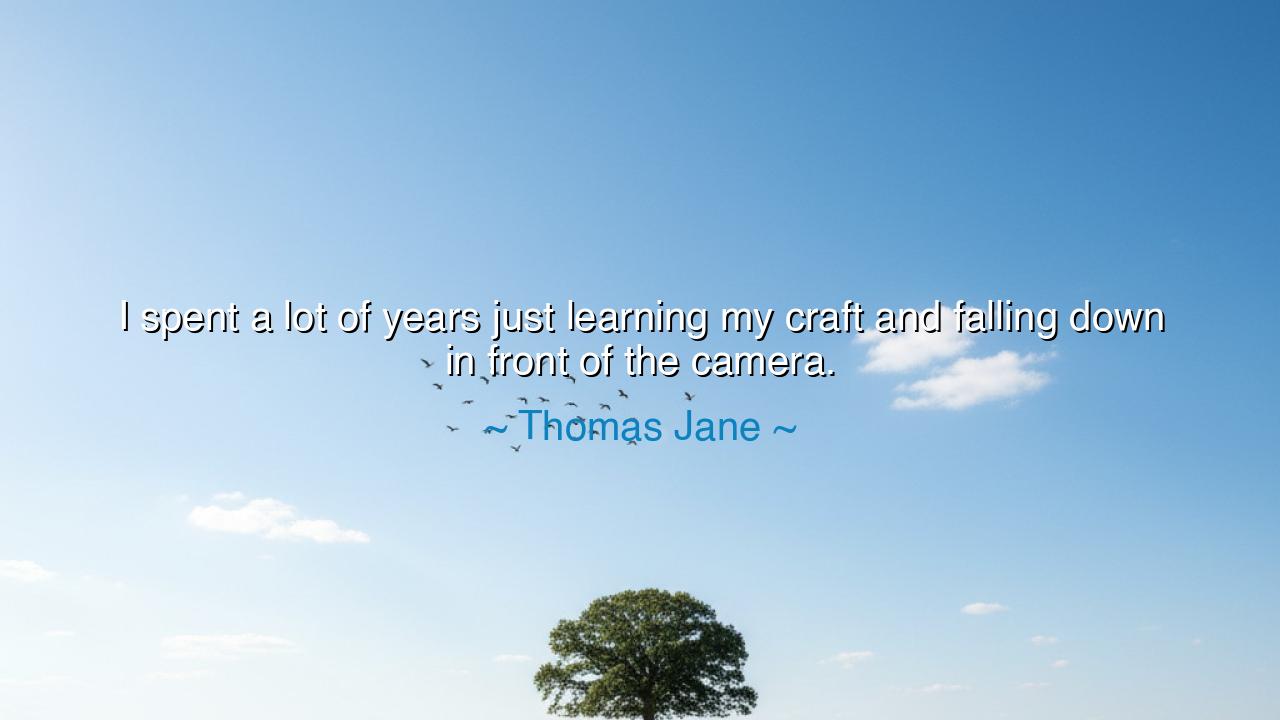
I spent a lot of years just learning my craft and falling down in






Hear the humble confession of Thomas Jane, who declared with candor: “I spent a lot of years just learning my craft and falling down in front of the camera.” In these words there is no boasting, no mask of perfection, but the deeper truth of mastery—that greatness is not born in a single moment of triumph, but forged in countless hours of struggle, error, and the courage to rise after each fall. He speaks not only of acting, but of the path of all who seek to become more than they are.
To learn a craft is to surrender to its discipline, to accept that the early years will be filled not with glory but with mistakes. Just as the blacksmith burns his hands before he tempers steel, just as the poet stumbles in verse before finding his song, so too the actor falters before the camera before discovering his truth. Thomas Jane calls these moments “falling down,” for in each attempt lies failure. Yet failure is not shameful—it is the very soil in which skill and resilience grow.
History offers many mirrors to this truth. Consider the tale of Thomas Edison, who before inventing the light bulb endured thousands of failed experiments. When asked about his failures, he said he had not failed but discovered thousands of ways that did not work. His falls became his teachers. In the same way, Jane’s time “falling in front of the camera” was not wasted—it was the sacred apprenticeship of error, a crucible from which confidence and mastery eventually emerged.
The ancients, too, understood this law of growth. The philosopher Seneca wrote that “difficulties strengthen the mind, as labor does the body.” To stumble is no dishonor, but to refuse to rise again is the only true defeat. Jane’s words carry this ancient wisdom: that the repeated act of stumbling, enduring, and trying again is the furnace in which both character and skill are refined.
What he names as “a lot of years” is also a reminder of patience. The path of mastery is long and often hidden from the eyes of the world. Many desire immediate success, but such success is shallow and fleeting. True greatness comes slowly, built upon foundations that cannot be shaken. Just as a mighty tree grows for decades unseen beneath the soil before it towers above the forest, so too must the craftsman endure years of unseen growth before his work bears lasting fruit.
The lesson is clear: do not despise your falling down, for each failure is a step toward strength. Do not rush past the years of learning, for they are the very years that form your foundation. The applause of the crowd may be fleeting, but the discipline of the craft endures. What matters is not that you fall, but that you rise, learn, and continue the journey.
Practical action flows from this truth. Whatever your craft—whether in art, study, leadership, or daily life—embrace the stumbles as part of your education. Seek opportunities to test yourself, even if you fail, for each test teaches you more than ease ever could. Do not measure your worth by how often you fall, but by how steadfastly you continue to rise. And above all, let patience be your companion, for mastery is a marathon, not a sprint.
Thus, Thomas Jane’s words endure as a teaching for every generation: that learning your craft means falling again and again, but also rising, stronger and wiser each time. Let these words remind us that the path to greatness is paved not with perfection, but with persistence, humility, and the courage to endure failure as the truest teacher.






AAdministratorAdministrator
Welcome, honored guests. Please leave a comment, we will respond soon